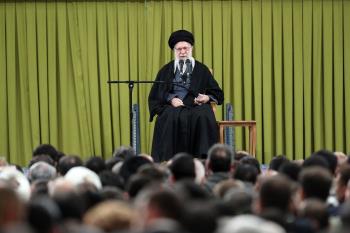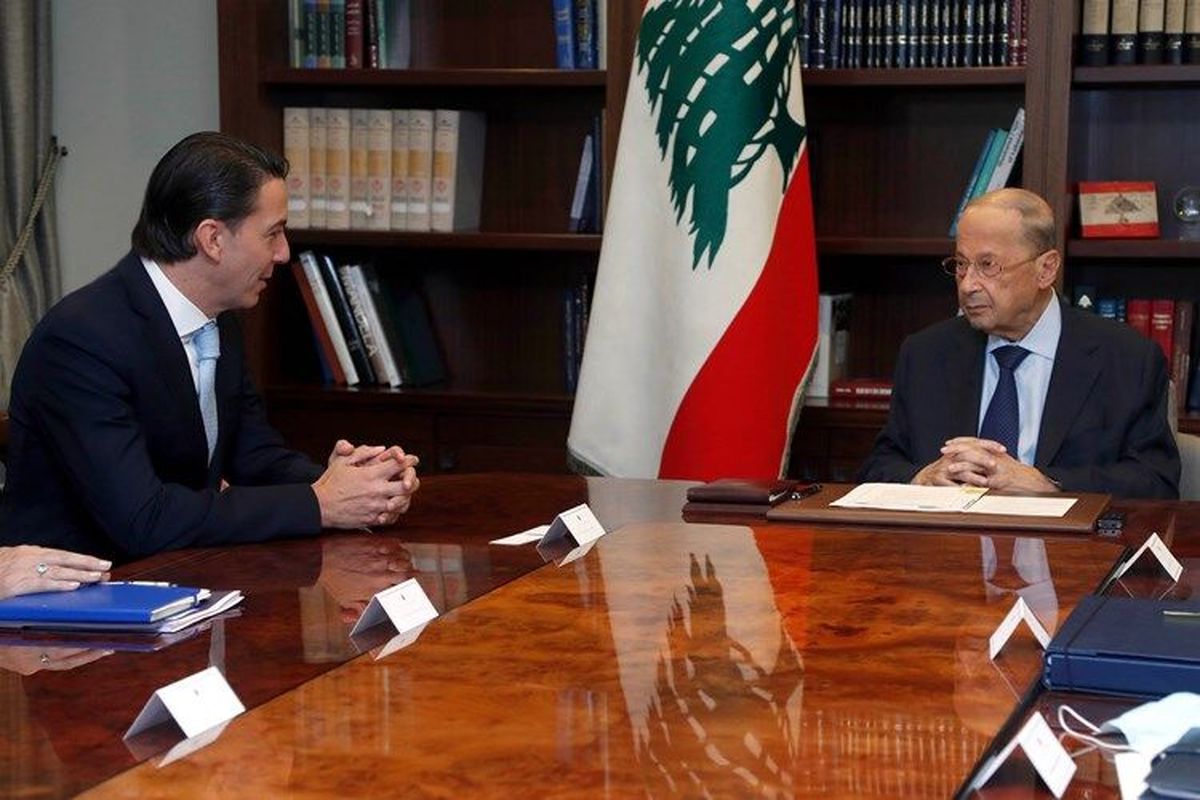Alwaght- Following recent Israeli aggression against the Lebanese interests by drilling in the joint Karish gas field with Lebanon, Lebanese officials called on the US envoy to their negotiations with the Israelis, Amos Hochstein, to mediate between Beirut and Tel Aviv.
Hochstein first met with Lebanese officials, including President Michel Aoun, Prime Minister Najib Mikati and Lebanese Parliament Speaker Nabih Berri, to find out the latest Lebanese positions on gas talks.
Some details released by the media suggest that Lebanon called for the resumption of indirect talks with Israel and a halt to oil and gas exploration in its field until the end of the talks.
"We have proposed expanding the sea area from 860 square kilometers to about 1,200 square kilometers to include also Qana gas field," a Lebanese official said of talks between Hochstein and Lebanese officials.
According to the Lebanese official, negotiations between the two sides will resume "if Tel Aviv accepts Lebanon's new proposal." Hochstein then visited Tel Aviv and delivered Lebanon's response to the Israeli leaders.
The US backs Israeli interests
Although in principle the mediating country should be neutral in order to resolve the differences between the parties involved, the US, because of its strategic relationship with the Israeli regime, has sided with the Israelis in this maritime border dispute and is trying to make any future agreement serving Israeli interests. Meanwhile, some media outlets revealed a secret US document in which it asked Lebanon to concede to the Israeli regime an important border area in Karish gas field. According to the document, Washington is committed to Israel's demand and position and believes that the disputed maritime zone in Karish area and Line 29 is outside the Lebanese waters, and proposes the division of the zone into two parts as a satisfactory solution for both sides. Actually, the Lebanese argument concerning Line 29 area is not recognized by the Americans, said the document.
It is noteworthy that Hochstein is a Jew and was born in the occupied Palestinian territories and served in the Israeli army for three years. Therefore, a Jewish American in the negotiations cannot have a neutral position, and the end of the issue is already clear. Some analysts believe that there is a concern that Hochstein could play a treacherous role and wrest from the Lebanese the necessary concessions to Israel and deprive Lebanon of its minimum water, oil, and gas rights in the Mediterranean Sea exploiting the grave governance structure, economic crisis, and the unhealthy rivalry of political parties in Lebanon.
Many analysts believe that the main goal of Washington and Tel Aviv in maritime talks is to push Lebanon to normalization with the Israeli regime. Actually, the Israelis have been exploring energy for years in the disputed area and do not need the precise border drawing as much as Lebanon does, and therefore they have other goals.
Lebanon's position
Though Washington and Tel Aviv are trying to conclude the gas field talks to detriment of Lebanon, the Lebanese insist to realize their rights and are not willing to back down from their demands. Lebanese officials described the Israeli move to explore energy in the disputed waters as hostile and a threat to international security and peace, and a disruption to the border demarcation process. The head of Lebanese commitee for sea border demarcation asserted that Lebanon should negotiate from a position of power and secure its right for exploration and production of energy to Line 29 area.
Lebanon has prepared a written response to be presented to the American mediator, in which it is emphasized that Lebanon will not withdraw "even one square meter" from the Qana gas field in favor of the Israeli regime in the border negotiations. Lebanon's unified position on the demarcation of the country's borders, which is seen for the first time, itself makes up an overwhelming part of victory, because the difference of positions endangers their national energy rights. PM Mikati said that any Israeli exploration, drilling, or production operation in the disputed area is recognized as an act of aggression and that diplomatic contacts will be made with major countries and the UN to clarify Lebanon's position and reaffirm its clinging to its rights.
Hezbollah Secretary-General Sayyed Hassan Nasrallah and other officials of powerful movement stated that the resistance is ready to react in any way possible to prevent illegal actions by the Israelis. Resistance is a nickname given to Hezbollah and other regional movements resisting Israeli and American colonialist projects. Hezbollah's deputy secretary-general called on the Lebanese government to show more determination, step up its pressure, and state explicitly whether the talks are continuing or that they have completely failed and it is a done issue. Sayed Nasrallah in a warning to Tel Aviv said that oil and gas resources are the right of the Lebanese people and that Hezbollah will not allow the Israelis to explore until the full rights of the Lebanese are secured and will take its right from the Israelis "by force."
Some Lebanese figures are not optimistic about the outcome of the mediation talks given the American record and stress that Lebanon must take a clear path to its maritime resources as soon as possible and not wait for the resumption of indirect talks with Tel Aviv or their outcome, because apart from the disputed area, there are other energy blocks that belong to Lebanon, and the country can legally explore for energy in them.
Obstacles ahead of talks
One of the issues hampering the talks is that Lebanon signed the sea rights convention while the Israeli regime is not a signatory to it and therefore is not checked by any laws and measures everything by its interests. As long as the Israelis do not adhere to the sea rights convention, the road to a deal is bumpy.
That is a source of fundamental differences between the two sides. The Lebanese say that a hefty chunk of Karish oil field is located within their borders, and on the opposite side, Tel Aviv claims that the whole region is its territory. Moreover, Lebanon officials suggest that there are indications that the Israelis intend to take advantage of the energy crisis and the country's economic challenges in order to wrest concessions in the event of the resumption of indirect talks with Lebanon. The Lebanese officials argue that the country has the ability to explore its gas and oil, but the US is the main factor stymying Lebanon drilling operations. After eruption of Ukraine crisis, the Americans and the Europeans raised a need for Israeli oil and gas to meet their energy consumption. Driven by this need, Washington is trying to side with the Israelis in the Beirut-Tel Aviv talks and secure most of energy resources to the Israeli side for exports to Europe.
The indirect Israeli-Lebanese talks kicked off in October 2020 after three years of diplomatic efforts and American pressures but failed to yield an agreement due to the excessive demands of the Israelis who lay their claim on the whole of these resources. But Lebanon's hands are no longer tied and thanks to Hezbollah defense of national interests, Beirut can squeeze its rights out of the Israeli occupation hands. Frequent Hezbollah warnings to Tel Aviv carry a clear message to the Israelis: If you make a mistake, your losses would outmeasure your gains.



























